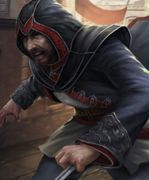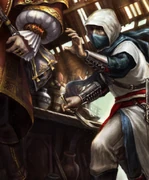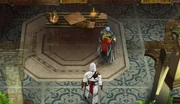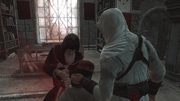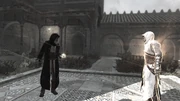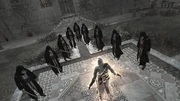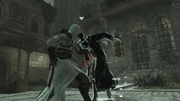No edit summary |
(→Trivia: If we are gonna put that in quote I better use the actual verbatim wordage. I added that bit to show the context in which Sage was used.) |
||
| (35 intermediate revisions by 15 users not shown) | |||
| Line 1: | Line 1: | ||
{{Era|Individuals|Assassins|Featured}} |
{{Era|Individuals|Assassins|Featured}} |
||
{{WP-REAL|Rashid ad-Din Sinan}} |
{{WP-REAL|Rashid ad-Din Sinan}} |
||
| + | {{Update|''[[Assassin's Creed: Rebellion]]'' – ''[[The Eagle's Shadow]]''}} |
||
{{Youmay|the Mentor of the Levantine Assassins|the 18th century Egyptian [[Al Mualim (1794)|Assassin]]}} |
{{Youmay|the Mentor of the Levantine Assassins|the 18th century Egyptian [[Al Mualim (1794)|Assassin]]}} |
||
{{Quote|I applied my heart to know wisdom, and to know madness and folly. I perceived that this also was a chasing at the wind. For in much wisdom, is much grief, and he that increaseth knowledge, increaseth sorrow.|Al Mualim, quoting the Holy Bible, Ecclesiastes 1:17.|Assassin's Creed}} |
{{Quote|I applied my heart to know wisdom, and to know madness and folly. I perceived that this also was a chasing at the wind. For in much wisdom, is much grief, and he that increaseth knowledge, increaseth sorrow.|Al Mualim, quoting the Holy Bible, Ecclesiastes 1:17.|Assassin's Creed}} |
||
| Line 7: | Line 8: | ||
|birth = 1135<br>{{Wiki|Basra}}, {{Wiki|Abbasid Caliphate}} |
|birth = 1135<br>{{Wiki|Basra}}, {{Wiki|Abbasid Caliphate}} |
||
|death = September 1191 (aged 56)<br>[[Masyaf]], [[Levantine Brotherhood of Assassins|Assassin state]] |
|death = September 1191 (aged 56)<br>[[Masyaf]], [[Levantine Brotherhood of Assassins|Assassin state]] |
||
| + | |species = [[Human]] |
||
|affiliates = [[Assassins]] |
|affiliates = [[Assassins]] |
||
*[[Levantine Brotherhood of Assassins|Levantine Brotherhood]]<br>[[Templars]] |
*[[Levantine Brotherhood of Assassins|Levantine Brotherhood]]<br>[[Templars]] |
||
| Line 12: | Line 14: | ||
|voice = [[Peter Renaday]] |
|voice = [[Peter Renaday]] |
||
|database = [[Database: Al Mualim|Al Mualim]]}} |
|database = [[Database: Al Mualim|Al Mualim]]}} |
||
| − | ''' |
+ | '''Rashid ad-din Sinan'''<ref name="Infographics">''[[Assassin's Creed: Infographics]]''</ref> (Arabic: رشيد الدين سنان), better known as '''Al Mualim''' (Arabic: المعلم, ''The Mentor'') and as the '''Old Man of the Mountain,'''<ref>[[Assassin's Creed: Revelations (novel)|''Assassin's Creed: Revelations'' novel]]</ref> (Arabic: شيخ الجبل, ''Shaykh al-Jabal'') was the [[Mentor]] of the [[Levantine Brotherhood of Assassins|Levantine Brotherhood]] of [[Assassins]] until his death in 1191, and the tutor to his eventual successor, [[Altaïr Ibn-La'Ahad]]. |
Al Mualim's desire to obtain an [[Apple of Eden 2|Apple of Eden]] led to him secretly working with the [[Templars|Knights Templar]], sworn enemies of his own Order.<ref name="TSC">''[[Assassin's Creed: The Secret Crusade]]''</ref> Despite this, Al Mualim's teachings and work during his lifetime ultimately had a positive influence on the Assassins going forward. |
Al Mualim's desire to obtain an [[Apple of Eden 2|Apple of Eden]] led to him secretly working with the [[Templars|Knights Templar]], sworn enemies of his own Order.<ref name="TSC">''[[Assassin's Creed: The Secret Crusade]]''</ref> Despite this, Al Mualim's teachings and work during his lifetime ultimately had a positive influence on the Assassins going forward. |
||
| Line 25: | Line 27: | ||
While there, Umar was to leave a warning to Salāḥ ad-Dīn, using the information that was gathered by a spy who had infiltrated the camp. Umar was successful, and managed to leave a [[feathers|feather]] and dagger inside the warlord's tent. However, as he escaped, he was forced to kill a nobleman to prevent himself from being captured.<ref name="TSC"/> |
While there, Umar was to leave a warning to Salāḥ ad-Dīn, using the information that was gathered by a spy who had infiltrated the camp. Umar was successful, and managed to leave a [[feathers|feather]] and dagger inside the warlord's tent. However, as he escaped, he was forced to kill a nobleman to prevent himself from being captured.<ref name="TSC"/> |
||
| − | The following day, Saladin left the camp, leaving his uncle and second-in-command, [[Šihāb ad-Dīn|Shihab Al'din]], in charge. Shihab came over to negotiate peace, claiming that they would leave once the killer of the nobleman had been executed. He revealed that he was aware of Umar because of the imprisonment of the spy, [[Ahmad Sofian]]. |
+ | The following day, Saladin left the camp, leaving his uncle and second-in-command, [[Šihāb ad-Dīn|Shihab Al'din]], in charge. Shihab came over to negotiate peace, claiming that they would leave once the killer of the nobleman had been executed. He revealed that he was aware of Umar because of the imprisonment of the spy, [[Ahmad Sofian]]. Al Mualim was reluctant to give up Umar, who begged for permission to take the place of Ahmad, though he eventually relented. After the death of Umar, the Saracens left Masyaf.<ref name="TSC"/> |
===Mentoring Altaïr and Abbas=== |
===Mentoring Altaïr and Abbas=== |
||
| Line 33: | Line 35: | ||
Despite Al Mualim's explicit order not to do so, Altaïr relented and told Abbas of his father's death during a training session. This eventually went sour, as Abbas made an attempt on Altaïr's life while they sparred with real swords, due to the lax monitoring of the Assassin instructor, [[Labib]]. To punish the pair, Al Mualim had Altaïr and Abbas placed in Masyaf's cells for a month, though he also extended Abbas' training for a year due to the young Assassin's outburst.<ref name="TSC"/> |
Despite Al Mualim's explicit order not to do so, Altaïr relented and told Abbas of his father's death during a training session. This eventually went sour, as Abbas made an attempt on Altaïr's life while they sparred with real swords, due to the lax monitoring of the Assassin instructor, [[Labib]]. To punish the pair, Al Mualim had Altaïr and Abbas placed in Masyaf's cells for a month, though he also extended Abbas' training for a year due to the young Assassin's outburst.<ref name="TSC"/> |
||
| − | In 1189, the Templars invaded Masyaf and managed to take Al Mualim prisoner. [[Haras]], a |
+ | In 1189, the Templars invaded Masyaf and managed to take Al Mualim prisoner. [[Haras]], a former Assassin apprentice who, dissatisfied with his slow progress through the Assassin ranks, had defected to the Templars, ordered the execution of all Assassins that remained in the fortress. However, Al Mualim was saved by Altaïr, who managed to kill Haras. Walking with Altaïr, Al Mualim told him of the pride he felt for his actions and how much the Assassin resembled his father, before promoting Altaïr to become a Master Assassin. |
===Quest for the Chalice=== |
===Quest for the Chalice=== |
||
| Line 52: | Line 54: | ||
===Hunt for the Nine=== |
===Hunt for the Nine=== |
||
{{Quote|Oh, my child, we've only just begun. I hold here a list. Nine names adorn it. Nine men who need to die. They are plague-bringers, war-makers. Their power and influence corrupts the land and ensures the Crusades continue. You will find them. Kill them. In doing so, you'll sow the seeds of peace. Both for the region, and for yourself. In this way you might be redeemed.|Al Mualim's offer to Altaïr.|Assassin's Creed}}[[File:Hunt list.png|thumb|250px|left|Al Mualim holding the list of Templars]] |
{{Quote|Oh, my child, we've only just begun. I hold here a list. Nine names adorn it. Nine men who need to die. They are plague-bringers, war-makers. Their power and influence corrupts the land and ensures the Crusades continue. You will find them. Kill them. In doing so, you'll sow the seeds of peace. Both for the region, and for yourself. In this way you might be redeemed.|Al Mualim's offer to Altaïr.|Assassin's Creed}}[[File:Hunt list.png|thumb|250px|left|Al Mualim holding the list of Templars]] |
||
| − | Following Masun's death, Al Mualim offered Altaïr a chance at redemption, and showed him a list of [[Hunt for the Nine|nine men]] who needed to be eliminated. He claimed them to be tyrants of their cities, and so Altaïr's job was to assassinate them. After each kill, Altaïr was to report back to Al Mualim, whereupon he would be promoted a rank, and |
+ | Following Masun's death, Al Mualim offered Altaïr a chance at redemption, and showed him a list of [[Hunt for the Nine|nine men]] who needed to be eliminated. He claimed them to be tyrants of their cities, and so Altaïr's job was to assassinate them. After each kill, Altaïr was to report back to Al Mualim, whereupon he would be promoted a rank, and regain a piece of equipment and/or a skill. As Altaïr's first target was [[Tamir]] in [[Damascus]], Al Mualim sent the Assassin on his way, and after Tamir had been killed, Altaïr rode back to Masyaf to speak with the Mentor.<ref name="AC"/> |
Altaïr returned with questions, saying that Tamir had told him that he knew Al Mualim well and claimed that the deed Altaïr had just performed was leading to bigger things. With this, Al Mualim responded that he was withholding the information from the Assassin, to make sure Altaïr did not repeat his past mistakes.<ref name="AC"/> |
Altaïr returned with questions, saying that Tamir had told him that he knew Al Mualim well and claimed that the deed Altaïr had just performed was leading to bigger things. With this, Al Mualim responded that he was withholding the information from the Assassin, to make sure Altaïr did not repeat his past mistakes.<ref name="AC"/> |
||
| − | After |
+ | After Altaïr had travelled to the city of [[Acre]] and slayed [[Garnier de Naplouse]], the Assassin told Al Mualim about how some of Garnier's "patients" had treated Garnier as a friend. In response, Al Mualim claimed that a leader could find ways to make others obey them and that Altaïr should trust his own senses, not the words of his targets. |
| ⚫ | After assassinating [[Talal]] in Jerusalem, Altaïr expressed his confusion at Talal's choice of slaves: beggars, whores, addicts, lepers—the dregs of society. Al Mualim explained that a broken person could be rebuilt, turning them into a soldier that would be fervently loyal to their savior. The Mentor then told Altaïr that [[Richard I of England|King Richard I]] was emboldened by his victory in Acre, and planned to move south towards [[Jerusalem]]. He stated that Salāḥ ad-Dīn was surely aware of this, as he had gathered his men at the broken citadel of [[Arsuf]].<ref name="AC"/> |
||
| − | While he waited for Altaïr, and when he arrived, the Assassin told Al Mualim about how some of Garnier's "patients" had treated Garnier as a friend. In response, he claimed that a leader could find ways to make others obey them and that Altaïr should trust his own senses, not the words of his targets. When they were finished, Altaïr was promoted once more and given another piece of equipment. He then rode off to Jerusalem to take the life of [[Talal]], returning only once he was successful.<ref name="AC"/> |
||
| ⚫ | While Altaïr offered to kill both Richard and Salāḥ ad-Dīn, Al Mualim told him that it would scatter the [[Crusaders|Crusader]] and Saracen forces, subjecting the region to the aimless warriors' bloodlust. He went on to say that Altaïr should concern himself on the more immediate threat: those who governed the cities in Richard and Salāḥ ad-Dīn's absence. |
||
| ⚫ | |||
| − | |||
| ⚫ | While Altaïr offered to kill both Richard and Salāḥ ad-Dīn, Al Mualim told him that it would |
||
| − | |||
| − | Altaïr then rode towards Damascus to kill [[Abu'l Nuqoud]], the merchant king of the city. Once he had finished his task and reported to Damascus' Bureau leader, he rode for Masyaf to speak with Al Mualim once more.<ref name="AC"/> |
||
[[File:Abu'l Assassination 5.png|thumb|250px|Altaïr talking to Al Mualim in the library]] |
[[File:Abu'l Assassination 5.png|thumb|250px|Altaïr talking to Al Mualim in the library]] |
||
| − | + | After Altaïr had put to rest [[Abu'l Nuqoud]], the merchant king of Damascus, he returned to speak with Al Mualim in a corner of his library. The Mentor gave him gratitude, on behalf of both himself and the realm, saying that his apprentice's actions would no doubt provoke the peace the Order desired.<ref name="AC"/> |
|
| − | Altaïr told the Mentor |
+ | Altaïr told the Mentor of how his targets always seemed sure of their righteousness, and how he felt they were connected somehow. Al Mualim responded that, as an Assassin, it was his duty to notice and question. However, when Altaïr began to pose further questions, Al Mualim admonished him and told him it was also his duty to trust in his Master.<ref name="AC"/> |
| − | Altaïr |
+ | Altaïr returned to Acre to slay [[William of Montferrat]], and once the deed was done, Al Mualim noticed that there was something on Altaïr's mind. Asking the Assassin to speak about the troubles he had, Altaïr demanded direct answers from Al Mualim, claiming that he only gave him riddles in exchange.<ref name="AC"/> |
| ⚫ | Threatening to stop killing his targets if he did not receive answers, Altaïr went on to ask what bound the men he had been killing. Struck by his insolence, Al Mualim threatened Altaïr with a blade, but Altaïr called him out on his bluff, remarking that if any other Assassin could complete the task he had been given, it would have been done already.<ref name="AC"/> |
||
| − | Al Mualim waited for Altaïr in his study at Masyaf, where Altaïr reported as usual, though he noticed that there was something on Altaïr's mind. Asking the Assassin to speak about the troubles he had, Altaïr demanded direct answers from Al Mualim, claiming that he only gave him riddles in exchange.<ref name="AC"/> |
||
| ⚫ | The Mentor finally conceded, and told Altaïr that the men he had been striking down were all Templars. After this, Al Mualim told Altaïr that his assignment had not changed, merely the context in which he perceived it. With the matter settled, Altaïr was promoted again and granted another piece of equipment, with Al Mualim asking him how he had known he would not kill him. Altaïr admitted that he had not known, and had simply taken a "leap of faith".<ref name="AC"/> |
||
| ⚫ | Threatening to stop killing his targets if he did not receive answers, Altaïr went on to ask what bound the men he had been killing. Struck by his insolence, Al Mualim threatened Altaïr with a blade, but Altaïr called him out on his bluff, remarking that if any other Assassin could complete the task he had been given, |
||
| − | |||
| ⚫ | The Mentor finally conceded, and told Altaïr that the men he had been striking down were all Templars. After this, Al Mualim told Altaïr that his assignment had not changed, |
||
[[File:AC1 Altair Al Mualim Study.png|thumb|250px|left|Al Mualim and Altaïr discussing the Templars' agenda]] |
[[File:AC1 Altair Al Mualim Study.png|thumb|250px|left|Al Mualim and Altaïr discussing the Templars' agenda]] |
||
| − | Altaïr then |
+ | Altaïr then took the life of [[Majd Addin]], the regent of Jerusalem, and after returning to Masyaf tried to piece everything together. Al Mualim claimed that the Templars desired control, and the ultimate creation of a supposed "[[New World Order|New World]]".<ref name="AC"/> |
| − | Al Mualim |
+ | Al Mualim then gave Altaïr a glimpse of the Piece of Eden, claiming that it was how Moses parted the Red Sea, what had started the Trojan War, and what had enabled [[Jesus Christ]] to turn water into wine. Although unknown to Altaïr at the time, Al Mualim tried to use the artifact's power on him, though it proved ineffective.<ref name="AC"/> |
| + | Altaïr was then tasked with killing [[Jubair al Hakim]] in Damascus and Master [[Sibrand]] in Acre. After his seventh target had fallen, the Assassin pondered on why these two men's lives needed to be taken. Al Mualim responded that they were paving the way for change, by ensuring threats both old and new were not able to intervene.<ref name="AC"/> |
||
| − | Al Mualim then gave Altaïr a glimpse of the Piece of Eden, claiming that it was how Moses parted the Red Sea, what had started the Trojan War, and what had enabled [[Jesus Christ]] to turn water into wine. Although unknown to Altaïr at the time, Al Mualim tried to use the artifact's power on Altaïr, though it proved ineffective.<ref name="AC"/> |
||
| ⚫ | |||
| − | Altaïr gained another rank and another piece of equipment, then rode towards Damascus to assassinate Jubair. Once he had finished his mission and had exchanged words with the Bureau leader, Altaïr reported back to Al Mualim.<ref name="AC"/> |
||
| + | With this, the Mentor told Altaïr that the final man was the last one standing between them and [[Robert de Sablé]]. But before sending him on his way, Al Mualim asked Altaïr what he understood the "truth" to be. Altaïr answered that it was seeing the world the way it really was, for the world was an illusion that one could either submit to or transcend. He reveals his new understanding of the phrase "Nothing is true, everything is permitted" as meaning to transcend this illusion, and recognise that laws arise from reason rather than divinity. |
||
| + | Al Mualim asserts that this is why the Templars are a threat and why he sends Altaïr to kill them: because rather than dispel the illusion, they would use it to rule. With this newfound understanding of his cause, Altaïr leaves to seek out his penultimate target. |
||
| − | Welcoming Altaïr home, the Assassin pondered on why [[Jubair al Hakim]] and Sibrand's lives needed to be taken. Al Mualim responded, saying that their lives should have been, as they would have paved the way for change, in which problems were not given cause or reason to be intervened.<ref name="AC"/> |
||
| + | Al Mualim waited for Altaïr's return, upon which they discussed the last name on his list: the [[Grand Master of the Templar Order|Grand Master]] of the Knights Templar, Robert de Sablé. He claimed that once Robert tasted the Piece of Eden's power, he saw not a weapon to be destroyed, but a tool to be used. Not for power, however, but for peace. Although Al Mualim expresses admiration for this goal, he objects to the means, as peace should be understood and embraced rather than forced. |
||
| ⚫ | |||
| − | With this, the Mentor told Altaïr that the final man, [[Sibrand]], the grandmaster of the Teutonic Order, was the last one left standing between Altaïr and Robert. Al Mualim promoted Altaïr and gave him a piece of equipment, after which Altaïr rode for Acre to kill Sibrand. Once the Assassin had completed the task and had spoken to Acre's Bureau leader, he made haste back to Masyaf to speak with the Mentor.<ref name="AC"/> |
||
| − | Al Mualim |
+ | Al Mualim went on to say that Robert could not be allowed to get his hands on the treasure again, and he at last sent Altaïr to take Robert's life, giving the Assassin a [[Syrian Sabre]] to help him on his journey. When Robert was defeated by Altaïr in a trial by combat, the dying Grand Master revealed Al Mualim to have been a former Templar collaborator. He claimed that the only difference between him and Al Mualim, however, was that the Assassin Order's Mentor refused to share the power that the Piece of Eden provided.<ref name="AC"/> |
| − | |||
| − | Al Mualim went on to say that Robert's life ambition of power would be completed if he got his hands on the treasure again, and he at last sent Altaïr to take Robert's life, giving the Assassin a [[Syrian Sabre|sword]] similar to his own to help him on his journey. When Robert was fatally stabbed by Altaïr's blade, the dying Grand Master revealed Al Mualim to have been a former Templar collaborator. He claimed that the only difference between him and Al Mualim, however, was that the Assassin Order's Mentor refused to share the power that the Piece of Eden provided.<ref name="AC"/> |
||
===Death=== |
===Death=== |
||
{{Dialogue2|Al Mualim|I've found proof.|Altaïr|Proof of what?|That nothing is true, and everything is permitted!|Al Mualim confronting Altaïr at Masyaf.|Assassin's Creed}}[[File:AssassinsCreed Al Mualim holding the Piece of Eden.png|thumb|left|250px|Al Mualim wielding the Apple of Eden]] |
{{Dialogue2|Al Mualim|I've found proof.|Altaïr|Proof of what?|That nothing is true, and everything is permitted!|Al Mualim confronting Altaïr at Masyaf.|Assassin's Creed}}[[File:AssassinsCreed Al Mualim holding the Piece of Eden.png|thumb|left|250px|Al Mualim wielding the Apple of Eden]] |
||
| − | Altaïr hurried back to Masyaf, only to find that the people in the city had been put under a hypnotic trance by Al Mualim, with him and a few of his fellow Assassins |
+ | Altaïr hurried back to Masyaf, only to find that the people in the city had been put under a hypnotic trance by Al Mualim, with only him and a few of his fellow Assassins, including Malik, unaffected by the Piece of Eden. After dispatching several of Al Mualim's pawns and reaching the fortress gardens, Altaïr confronted his Master, who used the power of the Piece of Eden to restrain his former student. From there, Al Mualim taunted Altaïr from the balcony above, to which the Assassin struggled and questioned him about his motives.<ref name="AC"/> |
| − | Al Mualim replied that he had found proof that |
+ | Al Mualim replied that he had found proof that nothing is true and everything is permitted, and with this, he created illusions of the nine men Altaïr had killed, before sending them to battle him. Despite being outnumbered, Altaïr defeated these copies, though he was soon bound by the artifact again. Al Mualim repeated his trick, creating several replicas of himself this time around. However, the young Assassin managed to defeat all of them.<ref name="AC"/> |
| − | Binding Altaïr with the Piece of Eden's power once again, Al Mualim explained his motives |
+ | Binding Altaïr with the Piece of Eden's power once again, Al Mualim explained his motives: that he sought the same as Robert, but wanted the artifact for himself, hence using his apprentice to kill the Templars. Altaïr questioned why Al Mualim had allowed him to retain his mind; Al Mualim explained that who Altaïr was and what he did were intertwined too close together, to rob him of one would deprive Al Mualim of control over the other, and the other Templars who knew of the Apple had needed to die. But the Mentor admitted that he had tried, and failed, due to his student's ability to see through the illusion.<ref name="AC"/> |
| ⚫ | Al Mualim explained that the artifact was behind all of the legends and religious mysteries in history: they were all merely illusions made real. Altaïr argued that his plan to create peace using the Piece of Eden's power was just as much an illusion as the others. Al Mualim countered that it was no different from the religions and "[[Those Who Came Before|craven gods]]" which people were killing each other over and that all he was doing was creating a better illusion without violence. Altaïr reasoned that at least they chose to believe that illusion, but Al Mualim countered that this was untrue apart from the occasional convert or heretic. When Altaïr asserted that it still wasn't right, Al Mualim sighed in disappointment, telling him he'd abandoned logic and let emotion take control. Concluding they were at an end, Al Mualim and Altaïr dueled for the last time, and though the Assassin attacked with skill, Al Mualim was able to counter many of Altaïr's attacks and use the Piece of Eden to teleport across the garden. |
||
| ⚫ | |||
| ⚫ | Al Mualim explained that the artifact was behind all of the legends and religious mysteries in history: they were all merely illusions made real. Altaïr argued that his plan to create peace using the Piece of Eden's power was just as much an illusion as the others. Al Mualim countered that it |
||
| − | Eventually however, Altaïr bested his Master, making use of his [[Eagle Vision|gift]] to pierce through the illusions that the Piece of Eden created.<ref name="AC"/> As he died, Al Mualim claimed that he |
+ | Eventually however, Altaïr bested his Master, making use of his [[Eagle Vision|gift]] to pierce through the illusions that the Piece of Eden created.<ref name="AC"/> As he died, Al Mualim claimed that he could not destroy the only thing capable of bringing peace to the world, and added that Altaïr would not be able to destroy the Piece of Eden either. |
| ⚫ | |||
| − | After his death, Altaïr took his rank as the Mentor of the Levantine Assassins and, despite cremation being against the mandates of their Order and seen as extremely taboo by the culture and religion of the region, burned the body of his former master on a pyre. Altaïr did this as a precaution to determine whether or not his body was real or a phantom of the Apple of Eden. However, many of his fellow Assassins refused to accept their |
+ | After his death, Altaïr took his rank as the Mentor of the Levantine Assassins and, despite cremation being against the mandates of their Order and seen as extremely taboo by the culture and religion of the region, burned the body of his former master on a pyre. Altaïr did this as a precaution to determine whether or not his body was real or a phantom of the Apple of Eden. However, many of his fellow Assassins refused to accept their master's betrayal, and rioted in protest against Altaïr for some time.<ref name="AC"/><ref>''[[Assassin's Creed II]]''</ref> |
===Legacy=== |
===Legacy=== |
||
| Line 122: | Line 116: | ||
As a scholarly man, Al Mualim placed importance on education, spending much of his time in the Masyaf fortress, studying the books of the library. He had a thorough understanding of a variety of subjects, ranging from philosophy to science. In addition to preaching the Brotherhood's goal of peace in all things, he emphasized that the Creed pushed for peace within one's self as well; on one occasion he advised Altaïr not to demonize his enemies.<ref name="AC"/> |
As a scholarly man, Al Mualim placed importance on education, spending much of his time in the Masyaf fortress, studying the books of the library. He had a thorough understanding of a variety of subjects, ranging from philosophy to science. In addition to preaching the Brotherhood's goal of peace in all things, he emphasized that the Creed pushed for peace within one's self as well; on one occasion he advised Altaïr not to demonize his enemies.<ref name="AC"/> |
||
| + | |||
| + | However, Al Mualim is eventually revealed to be selfish, manipulative, deceptive and hypocritical. He is himself a [[Templar]] and intends to use the [[Piece of Eden]] to control the minds of all humanity. To this end he manipulated his assassins into obtaining the Piece of Eden and eliminating his Templar former allies for him so he could have the device to himself. When talking with Altaïr, he espouses views that he does not himself actually hold, such as that peace is to be understood and embraced rather than forced. It is unknown if he never truly held these views or he once did but subsequently renounced them for the Templar beliefs. <ref name="AC"/> |
||
| + | |||
| + | Nevertheless, despite everything, Al Mualim ultimately only desired peace for mankind, but he believed that the loss of free will was an acceptable price to pay for this goal. And although he may not have believed everything he taught Altaïr, his teachings did have a profound impact on his apprentice and thus the future of the Assassins. <ref name="AC"/> |
||
==Trivia== |
==Trivia== |
||
| − | *Al Mualim is based on {{Wiki|Rashid ad-Din Sinan}} (Arabic: رشيد الدين سینان), who was the leader of the {{wiki|Hashashin}} in the late 12th century. Even though |
+ | *Al Mualim is based on {{Wiki|Rashid ad-Din Sinan}} (Arabic: رشيد الدين سینان), who was the leader of the {{wiki|Hashashin}} in the late 12th century. Even though many references are made to the connection between the fictional character and Sinan, Ubisoft could not use Sinan's full name for legal reasons, at least until the release of ''Assassin's Creed: Infographics''. |
**However, Al Mualim's name was confirmed as Sinan in the [[Assassin's Creed (mobile game)|mobile version]] of ''Assassin's Creed''. |
**However, Al Mualim's name was confirmed as Sinan in the [[Assassin's Creed (mobile game)|mobile version]] of ''Assassin's Creed''. |
||
*Despite being Mentor of the Levantine Assassins, Al Mualim appeared to have all ten fingers. However, in ''[[Assassin's Creed: Revelations]]'', this error had been rectified, as all Assassins in Masyaf had one of their ring fingers removed. |
*Despite being Mentor of the Levantine Assassins, Al Mualim appeared to have all ten fingers. However, in ''[[Assassin's Creed: Revelations]]'', this error had been rectified, as all Assassins in Masyaf had one of their ring fingers removed. |
||
| − | *In the non-canonical [[Assassin's Creed (webcomic)|Penny Arcade comic]] for ''Assassin's Creed'', the target that Altaïr hunted implied that some Assassins, including Altaïr himself were children of Al Mualim. This was shown when he told him, ''"For I think I see Al Mualim's face in yours."'' |
||
| − | *When Altaïr used [[Eagle Vision]] after conversing about the nine targets, Al Mualim was marked with blue, the color of an ally, despite being revealed to be an enemy in the end. |
||
*If Altaïr countered Al Mualim with his sword and he disappeared, he could be prevented from disappearing again by hitting him with a throwing knife. |
*If Altaïr countered Al Mualim with his sword and he disappeared, he could be prevented from disappearing again by hitting him with a throwing knife. |
||
| + | *In Penny Arcade's non-canonical webcomic [[Assassin's Creed (webcomic)]], the antagonist tauntingly insinuated that Al Mualim may be the father of Altaïr and possibly other Assassins as well. |
||
*In ''[[Assassin's Creed: Altaïr's Chronicles]]'', which was set in 1190, Al Mualim was shown with a short black beard and dressed in merchant-like robes. However, in ''Revelations'', he was already shown with his iconic gray beard in 1189. |
*In ''[[Assassin's Creed: Altaïr's Chronicles]]'', which was set in 1190, Al Mualim was shown with a short black beard and dressed in merchant-like robes. However, in ''Revelations'', he was already shown with his iconic gray beard in 1189. |
||
*In ''Revelations'', Al Mualim's appearance underwent numerous changes, with the addition of a reddish tinge and several patterns imprinted on his robes, which were closer to gray than black, as well as having an altered face with a shorter beard. |
*In ''Revelations'', Al Mualim's appearance underwent numerous changes, with the addition of a reddish tinge and several patterns imprinted on his robes, which were closer to gray than black, as well as having an altered face with a shorter beard. |
||
*In the non-canonical mobile adaptation of ''Assassin's Creed'', Al Mualim's name and title is given as "Sinan, Master of the Assassins". He is portrayed as a shadowy figure clad in black Templar battle armor and shrouded with a black, hooded, gold-trimmed cloak that conceals his face save for his glowing, red eyes. He fights Altaïr Ibn-La'Ahad in Jerusalem because Masyaf is portrayed as a secret Templar base instead. In his duel, he wields a greatsword and uses the darkness to his advantage. He cannot be seen without being near a light source, and Altaïr has to stay near torches to have a chance of defeating him. In this version, Altaïr is unable to deduce that Sinan is a traitor despite Robert de Sablé hinting strongly at it, and he willingly gives the Apple of Eden to Sinan after retrieving it from Robert's corpse. Despite this, Sinan's motivation for trying to kill Altaïr stems from the possibility Altaïr could piece together Robert's words eventually, whereas in the canonical game, he has already carried out his betrayal by the time Altaïr returns, resolving to kill him only when he can neither convince nor force Altaïr to obey him. |
*In the non-canonical mobile adaptation of ''Assassin's Creed'', Al Mualim's name and title is given as "Sinan, Master of the Assassins". He is portrayed as a shadowy figure clad in black Templar battle armor and shrouded with a black, hooded, gold-trimmed cloak that conceals his face save for his glowing, red eyes. He fights Altaïr Ibn-La'Ahad in Jerusalem because Masyaf is portrayed as a secret Templar base instead. In his duel, he wields a greatsword and uses the darkness to his advantage. He cannot be seen without being near a light source, and Altaïr has to stay near torches to have a chance of defeating him. In this version, Altaïr is unable to deduce that Sinan is a traitor despite Robert de Sablé hinting strongly at it, and he willingly gives the Apple of Eden to Sinan after retrieving it from Robert's corpse. Despite this, Sinan's motivation for trying to kill Altaïr stems from the possibility Altaïr could piece together Robert's words eventually, whereas in the canonical game, he has already carried out his betrayal by the time Altaïr returns, resolving to kill him only when he can neither convince nor force Altaïr to obey him. |
||
| + | *In ''Assassin’s Creed: Infographics'' Al Mualim is described as being a [[Sage]] as well as the "Mentor of the Assassins of Masyaf". The use of the capitalized ⟨S⟩ implies a connection to [[Aita]], but this is not corroborated in any other media and may be an error. |
||
==Gallery== |
==Gallery== |
||
| Line 138: | Line 136: | ||
Al mualim.jpg|Concept art of Al Mualim |
Al mualim.jpg|Concept art of Al Mualim |
||
ACM Al Mualim 2.png|Al Mualim as he appears in ''[[Assassin's Creed: Memories]]'' |
ACM Al Mualim 2.png|Al Mualim as he appears in ''[[Assassin's Creed: Memories]]'' |
||
| + | ACReb_Al_Mualim.jpg|Al Mualim as he appears in ''[[Assassin's Creed: Rebellion]]'' – ''[[The Eagle's Shadow]]'' |
||
ACM Al Mualim.png|Al Mualim in his youth |
ACM Al Mualim.png|Al Mualim in his youth |
||
Al Mualim in Alep.jpg|Al Mualim meeting Altaïr in Alep |
Al Mualim in Alep.jpg|Al Mualim meeting Altaïr in Alep |
||
| Line 155: | Line 154: | ||
==Appearances== |
==Appearances== |
||
*''[[Assassin's Creed]]'' {{1st}} |
*''[[Assassin's Creed]]'' {{1st}} |
||
| − | *''Assassin's Creed II |
+ | *''[[Assassin's Creed II]]'' {{C|flashback}} |
| − | *''Assassin's Creed: Brotherhood |
+ | *''[[Assassin's Creed: Brotherhood]]'' {{C|flashback}} |
*''[[Assassin's Creed: The Secret Crusade]]'' |
*''[[Assassin's Creed: The Secret Crusade]]'' |
||
*''[[Assassin's Creed: Altaïr's Chronicles]]'' |
*''[[Assassin's Creed: Altaïr's Chronicles]]'' |
||
*''[[Assassin's Creed: Revelations]]'' |
*''[[Assassin's Creed: Revelations]]'' |
||
*''[[Assassin's Creed: Memories]]'' |
*''[[Assassin's Creed: Memories]]'' |
||
| + | *''[[Assassin's Creed: Rebellion]]'' – ''[[The Eagle's Shadow]]'' {{Fb}} |
||
==References== |
==References== |
||
| Line 171: | Line 171: | ||
{{ACM}} |
{{ACM}} |
||
{{ACFC}} |
{{ACFC}} |
||
| + | {{ACRebellion}} |
||
[[de:Rashid ad-Din Sinan]] |
[[de:Rashid ad-Din Sinan]] |
||
[[es:Rashid ad-Din Sinan]] |
[[es:Rashid ad-Din Sinan]] |
||
| Line 187: | Line 188: | ||
[[Category:1191 deaths]] |
[[Category:1191 deaths]] |
||
[[Category:Individuals]] |
[[Category:Individuals]] |
||
| − | [[Category: |
+ | [[Category:Assassin Brotherhood members]] |
[[Category:Levantine Assassins]] |
[[Category:Levantine Assassins]] |
||
[[Category:Mentors]] |
[[Category:Mentors]] |
||
| Line 193: | Line 194: | ||
[[Category:Templar allies]] |
[[Category:Templar allies]] |
||
[[Category:Individuals who held Pieces of Eden]] |
[[Category:Individuals who held Pieces of Eden]] |
||
| + | [[Category:Residents of Masyaf]] |
||
Revision as of 22:52, 13 May 2020

|
Patience, brothers. Soon we will reveal the secrets of Assassin's Creed: Rebellion – The Eagle's Shadow. This article has been identified as being out of date. Please update the article to reflect recent releases and then remove this template once done. |
| This article is about the Mentor of the Levantine Assassins. You may be looking for the 18th century Egyptian Assassin. |
- "I applied my heart to know wisdom, and to know madness and folly. I perceived that this also was a chasing at the wind. For in much wisdom, is much grief, and he that increaseth knowledge, increaseth sorrow."
- ―Al Mualim, quoting the Holy Bible, Ecclesiastes 1:17.[src]
Rashid ad-din Sinan[1] (Arabic: رشيد الدين سنان), better known as Al Mualim (Arabic: المعلم, The Mentor) and as the Old Man of the Mountain,[2] (Arabic: شيخ الجبل, Shaykh al-Jabal) was the Mentor of the Levantine Brotherhood of Assassins until his death in 1191, and the tutor to his eventual successor, Altaïr Ibn-La'Ahad.
Al Mualim's desire to obtain an Apple of Eden led to him secretly working with the Knights Templar, sworn enemies of his own Order.[3] Despite this, Al Mualim's teachings and work during his lifetime ultimately had a positive influence on the Assassins going forward.
Biography
Establishing Masyaf Castle
In 1162, Al Mualim was sent from Alamut to establish the fortress of Masyaf in Syria by Hassan the Younger,[4] the leader of the Levantine Brotherhood.[5] The catalyst for Al Mualim's departure was speculated by some to have been a conflict in ideology, with Al Mualim seeking to establish his own Assassin Order, but others believed he was merely ordered to nurture Assassin influence in the Levant. Foreshadowing his later treachery, rumors abounded that Al Mualim was secretly driven by a lust for power and kingship.[4]
Siege of Masyaf
In 1176, Saladin and his Saracen army laid siege to the fortress of Masyaf. Al Mualim, who was in charge of the Assassins at the time, had sent the Master Assassin Umar Ibn-La'Ahad to infiltrate the Saracen camp the following night.[3]
While there, Umar was to leave a warning to Salāḥ ad-Dīn, using the information that was gathered by a spy who had infiltrated the camp. Umar was successful, and managed to leave a feather and dagger inside the warlord's tent. However, as he escaped, he was forced to kill a nobleman to prevent himself from being captured.[3]
The following day, Saladin left the camp, leaving his uncle and second-in-command, Shihab Al'din, in charge. Shihab came over to negotiate peace, claiming that they would leave once the killer of the nobleman had been executed. He revealed that he was aware of Umar because of the imprisonment of the spy, Ahmad Sofian. Al Mualim was reluctant to give up Umar, who begged for permission to take the place of Ahmad, though he eventually relented. After the death of Umar, the Saracens left Masyaf.[3]
Mentoring Altaïr and Abbas
- "Altaïr, I have watched you grow from a boy to a man in so short a time, it fills me with as much sadness as pride."
- ―Al Mualim to Altaïr.[src]
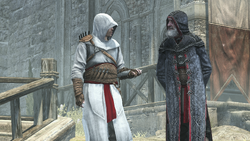
Al Mualim and Altaïr after Haras' death
Out of grief for Umar's death, Ahmad killed himself in front of Umar's son, the young novice Altaïr. The shocked boy told Al Mualim of this, which resulted in him taking the body away to cover up the suicide, along with mentioning that Altaïr would be training as an Assassin alongside Abbas Sofian. Al Mualim also ordered Altaïr never to tell Abbas of his father's death, believing it to be best for Abbas. Following this, he mentored both Altaïr and Abbas in the ways of the Assassin Order.[3]
Despite Al Mualim's explicit order not to do so, Altaïr relented and told Abbas of his father's death during a training session. This eventually went sour, as Abbas made an attempt on Altaïr's life while they sparred with real swords, due to the lax monitoring of the Assassin instructor, Labib. To punish the pair, Al Mualim had Altaïr and Abbas placed in Masyaf's cells for a month, though he also extended Abbas' training for a year due to the young Assassin's outburst.[3]
In 1189, the Templars invaded Masyaf and managed to take Al Mualim prisoner. Haras, a former Assassin apprentice who, dissatisfied with his slow progress through the Assassin ranks, had defected to the Templars, ordered the execution of all Assassins that remained in the fortress. However, Al Mualim was saved by Altaïr, who managed to kill Haras. Walking with Altaïr, Al Mualim told him of the pride he felt for his actions and how much the Assassin resembled his father, before promoting Altaïr to become a Master Assassin.
Quest for the Chalice
- "We treaded carelessly, they were following a man who was one of us."
- ―Al Mualim to Altaïr during the village attack.[src]
In 1190, Al Mualim ordered Altaïr to find a Piece of Eden known as the Chalice, shortly after he returned from an earlier assignment. During this year, he temporarily resided in the Assassin stronghold of Alep. His second-in-command at the time, Harash, sold out the Assassin Order to the Templars, but he was soon killed by Altaïr. Shortly after this event, Al Mualim relocated to Masyaf.[6]
Defending Masyaf
- "My men do not fear death, Robert! They welcome it, and the rewards it brings!"
- ―Al Mualim shouting to Robert from the walls of the fortress.[src]
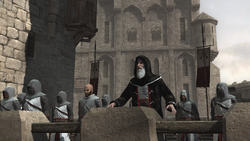
Al Mualim during the attack on Masyaf
In 1191, Al Mualim sent Altaïr to retrieve a treasure from the Jerusalem Vault beneath the remains of Solomon's Temple and bring it back to Masyaf, and sent two fellow Assassins on his journey, the brothers Malik and Kadar Al-Sayf, to accompany him. The mission, however, ended tragically, with Kadar losing his life, and Malik being brutally maimed due to Altaïr's disregard for the Creed.[7]
When Altaïr reported his failure to Al Mualim, the Mentor was infuriated, though his anger was curbed somewhat when Malik returned, revealing that he had managed to bring back the artifact. However, Robert de Sablé and his Templars had followed the Assassin and, intent on recovering their treasure, moved for an attack on Masyaf.[7]
Al Mualim spoke to Robert from the safety of the fortress walls, showcasing the dedication of his Assassins by ordering three of his men – Altaïr among them – to leap from a tower, supposedly to their deaths. He continued to hold their attention while Altaïr released a trap, killing and scattering the Templar forces.[7]
Though Altaïr saved Masyaf, Al Mualim demoted him from Master Assassin to a novice, stripping him of most of his equipment and his authority in the Order. He then sent Altaïr to find the traitor who had opened the gates to let the Templars through.[7]
After some investigation, Altaïr was successful and brought the traitor, Masun, before him. Al Mualim then offered Masun a chance to renounce the evil in his heart, but when the man did not, he killed the traitor who knelt before him with a sword.[7]
Hunt for the Nine
- "Oh, my child, we've only just begun. I hold here a list. Nine names adorn it. Nine men who need to die. They are plague-bringers, war-makers. Their power and influence corrupts the land and ensures the Crusades continue. You will find them. Kill them. In doing so, you'll sow the seeds of peace. Both for the region, and for yourself. In this way you might be redeemed."
- ―Al Mualim's offer to Altaïr.[src]
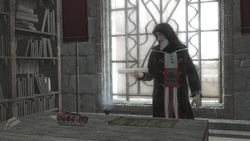
Al Mualim holding the list of Templars
Following Masun's death, Al Mualim offered Altaïr a chance at redemption, and showed him a list of nine men who needed to be eliminated. He claimed them to be tyrants of their cities, and so Altaïr's job was to assassinate them. After each kill, Altaïr was to report back to Al Mualim, whereupon he would be promoted a rank, and regain a piece of equipment and/or a skill. As Altaïr's first target was Tamir in Damascus, Al Mualim sent the Assassin on his way, and after Tamir had been killed, Altaïr rode back to Masyaf to speak with the Mentor.[7]
Altaïr returned with questions, saying that Tamir had told him that he knew Al Mualim well and claimed that the deed Altaïr had just performed was leading to bigger things. With this, Al Mualim responded that he was withholding the information from the Assassin, to make sure Altaïr did not repeat his past mistakes.[7]
After Altaïr had travelled to the city of Acre and slayed Garnier de Naplouse, the Assassin told Al Mualim about how some of Garnier's "patients" had treated Garnier as a friend. In response, Al Mualim claimed that a leader could find ways to make others obey them and that Altaïr should trust his own senses, not the words of his targets.
After assassinating Talal in Jerusalem, Altaïr expressed his confusion at Talal's choice of slaves: beggars, whores, addicts, lepers—the dregs of society. Al Mualim explained that a broken person could be rebuilt, turning them into a soldier that would be fervently loyal to their savior. The Mentor then told Altaïr that King Richard I was emboldened by his victory in Acre, and planned to move south towards Jerusalem. He stated that Salāḥ ad-Dīn was surely aware of this, as he had gathered his men at the broken citadel of Arsuf.[7]
While Altaïr offered to kill both Richard and Salāḥ ad-Dīn, Al Mualim told him that it would scatter the Crusader and Saracen forces, subjecting the region to the aimless warriors' bloodlust. He went on to say that Altaïr should concern himself on the more immediate threat: those who governed the cities in Richard and Salāḥ ad-Dīn's absence.
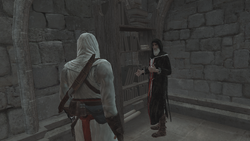
Altaïr talking to Al Mualim in the library
After Altaïr had put to rest Abu'l Nuqoud, the merchant king of Damascus, he returned to speak with Al Mualim in a corner of his library. The Mentor gave him gratitude, on behalf of both himself and the realm, saying that his apprentice's actions would no doubt provoke the peace the Order desired.[7]
Altaïr told the Mentor of how his targets always seemed sure of their righteousness, and how he felt they were connected somehow. Al Mualim responded that, as an Assassin, it was his duty to notice and question. However, when Altaïr began to pose further questions, Al Mualim admonished him and told him it was also his duty to trust in his Master.[7]
Altaïr returned to Acre to slay William of Montferrat, and once the deed was done, Al Mualim noticed that there was something on Altaïr's mind. Asking the Assassin to speak about the troubles he had, Altaïr demanded direct answers from Al Mualim, claiming that he only gave him riddles in exchange.[7]
Threatening to stop killing his targets if he did not receive answers, Altaïr went on to ask what bound the men he had been killing. Struck by his insolence, Al Mualim threatened Altaïr with a blade, but Altaïr called him out on his bluff, remarking that if any other Assassin could complete the task he had been given, it would have been done already.[7]
The Mentor finally conceded, and told Altaïr that the men he had been striking down were all Templars. After this, Al Mualim told Altaïr that his assignment had not changed, merely the context in which he perceived it. With the matter settled, Altaïr was promoted again and granted another piece of equipment, with Al Mualim asking him how he had known he would not kill him. Altaïr admitted that he had not known, and had simply taken a "leap of faith".[7]
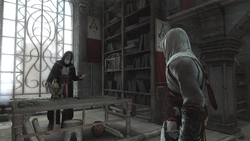
Al Mualim and Altaïr discussing the Templars' agenda
Altaïr then took the life of Majd Addin, the regent of Jerusalem, and after returning to Masyaf tried to piece everything together. Al Mualim claimed that the Templars desired control, and the ultimate creation of a supposed "New World".[7]
Al Mualim then gave Altaïr a glimpse of the Piece of Eden, claiming that it was how Moses parted the Red Sea, what had started the Trojan War, and what had enabled Jesus Christ to turn water into wine. Although unknown to Altaïr at the time, Al Mualim tried to use the artifact's power on him, though it proved ineffective.[7]
Altaïr was then tasked with killing Jubair al Hakim in Damascus and Master Sibrand in Acre. After his seventh target had fallen, the Assassin pondered on why these two men's lives needed to be taken. Al Mualim responded that they were paving the way for change, by ensuring threats both old and new were not able to intervene.[7]
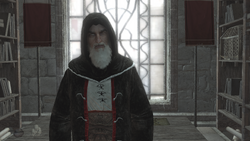
Al Mualim in his study in Masyaf
With this, the Mentor told Altaïr that the final man was the last one standing between them and Robert de Sablé. But before sending him on his way, Al Mualim asked Altaïr what he understood the "truth" to be. Altaïr answered that it was seeing the world the way it really was, for the world was an illusion that one could either submit to or transcend. He reveals his new understanding of the phrase "Nothing is true, everything is permitted" as meaning to transcend this illusion, and recognise that laws arise from reason rather than divinity.
Al Mualim asserts that this is why the Templars are a threat and why he sends Altaïr to kill them: because rather than dispel the illusion, they would use it to rule. With this newfound understanding of his cause, Altaïr leaves to seek out his penultimate target.
Al Mualim waited for Altaïr's return, upon which they discussed the last name on his list: the Grand Master of the Knights Templar, Robert de Sablé. He claimed that once Robert tasted the Piece of Eden's power, he saw not a weapon to be destroyed, but a tool to be used. Not for power, however, but for peace. Although Al Mualim expresses admiration for this goal, he objects to the means, as peace should be understood and embraced rather than forced.
Al Mualim went on to say that Robert could not be allowed to get his hands on the treasure again, and he at last sent Altaïr to take Robert's life, giving the Assassin a Syrian Sabre to help him on his journey. When Robert was defeated by Altaïr in a trial by combat, the dying Grand Master revealed Al Mualim to have been a former Templar collaborator. He claimed that the only difference between him and Al Mualim, however, was that the Assassin Order's Mentor refused to share the power that the Piece of Eden provided.[7]
Death
- Al Mualim: "I've found proof."
- Altaïr: "Proof of what?"
- Al Mualim: "That nothing is true, and everything is permitted!"
- —Al Mualim confronting Altaïr at Masyaf.[src]
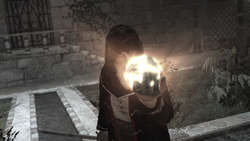
Al Mualim wielding the Apple of Eden
Altaïr hurried back to Masyaf, only to find that the people in the city had been put under a hypnotic trance by Al Mualim, with only him and a few of his fellow Assassins, including Malik, unaffected by the Piece of Eden. After dispatching several of Al Mualim's pawns and reaching the fortress gardens, Altaïr confronted his Master, who used the power of the Piece of Eden to restrain his former student. From there, Al Mualim taunted Altaïr from the balcony above, to which the Assassin struggled and questioned him about his motives.[7]
Al Mualim replied that he had found proof that nothing is true and everything is permitted, and with this, he created illusions of the nine men Altaïr had killed, before sending them to battle him. Despite being outnumbered, Altaïr defeated these copies, though he was soon bound by the artifact again. Al Mualim repeated his trick, creating several replicas of himself this time around. However, the young Assassin managed to defeat all of them.[7]
Binding Altaïr with the Piece of Eden's power once again, Al Mualim explained his motives: that he sought the same as Robert, but wanted the artifact for himself, hence using his apprentice to kill the Templars. Altaïr questioned why Al Mualim had allowed him to retain his mind; Al Mualim explained that who Altaïr was and what he did were intertwined too close together, to rob him of one would deprive Al Mualim of control over the other, and the other Templars who knew of the Apple had needed to die. But the Mentor admitted that he had tried, and failed, due to his student's ability to see through the illusion.[7]
Al Mualim explained that the artifact was behind all of the legends and religious mysteries in history: they were all merely illusions made real. Altaïr argued that his plan to create peace using the Piece of Eden's power was just as much an illusion as the others. Al Mualim countered that it was no different from the religions and "craven gods" which people were killing each other over and that all he was doing was creating a better illusion without violence. Altaïr reasoned that at least they chose to believe that illusion, but Al Mualim countered that this was untrue apart from the occasional convert or heretic. When Altaïr asserted that it still wasn't right, Al Mualim sighed in disappointment, telling him he'd abandoned logic and let emotion take control. Concluding they were at an end, Al Mualim and Altaïr dueled for the last time, and though the Assassin attacked with skill, Al Mualim was able to counter many of Altaïr's attacks and use the Piece of Eden to teleport across the garden.
Eventually however, Altaïr bested his Master, making use of his gift to pierce through the illusions that the Piece of Eden created.[7] As he died, Al Mualim claimed that he could not destroy the only thing capable of bringing peace to the world, and added that Altaïr would not be able to destroy the Piece of Eden either.
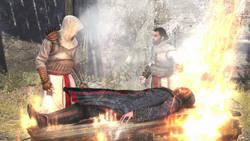
Al Mualim's body burning
After his death, Altaïr took his rank as the Mentor of the Levantine Assassins and, despite cremation being against the mandates of their Order and seen as extremely taboo by the culture and religion of the region, burned the body of his former master on a pyre. Altaïr did this as a precaution to determine whether or not his body was real or a phantom of the Apple of Eden. However, many of his fellow Assassins refused to accept their master's betrayal, and rioted in protest against Altaïr for some time.[7][8]
Legacy
In 2014, the Templar Juhani Otso Berg acknowledged Al Mualim's agreement with the Templar ideals, admitting that he was an example of how the Assassin–Templar War could have been avoided if more Assassins had bent to Templar motives, rather than taking their own path of free will.[9]
Personality and characteristics
- "Why not share what you have learned with everyone, like a proper Assassin? Why not share with your brothers the true extent of your ambition? Where is your sense of fraternity?"
- ―Haras' skeptical outlook on Al Mualim's persona.[src]
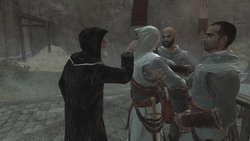
Al Mualim talking to a restrained Altaïr
Al Mualim, though known for being a wise and soft-spoken leader, at times showed himself to be mysterious and unpredictable. He never spoke of anything too personal or suspicious about himself, changing the subject or giving an unexpected answer when people started questioning him deeply.[7]
He revealed little about himself, and so almost nothing was known about his early life, let alone anything beyond his duty as the Master of the Assassins. By his efforts, the Order became a well-known, yet obscure faction, inspiring fear and uncertainty throughout the land, and spreading rumors that only increased the already legendary reputation of the Brotherhood.[7]
As a scholarly man, Al Mualim placed importance on education, spending much of his time in the Masyaf fortress, studying the books of the library. He had a thorough understanding of a variety of subjects, ranging from philosophy to science. In addition to preaching the Brotherhood's goal of peace in all things, he emphasized that the Creed pushed for peace within one's self as well; on one occasion he advised Altaïr not to demonize his enemies.[7]
However, Al Mualim is eventually revealed to be selfish, manipulative, deceptive and hypocritical. He is himself a Templar and intends to use the Piece of Eden to control the minds of all humanity. To this end he manipulated his assassins into obtaining the Piece of Eden and eliminating his Templar former allies for him so he could have the device to himself. When talking with Altaïr, he espouses views that he does not himself actually hold, such as that peace is to be understood and embraced rather than forced. It is unknown if he never truly held these views or he once did but subsequently renounced them for the Templar beliefs. [7]
Nevertheless, despite everything, Al Mualim ultimately only desired peace for mankind, but he believed that the loss of free will was an acceptable price to pay for this goal. And although he may not have believed everything he taught Altaïr, his teachings did have a profound impact on his apprentice and thus the future of the Assassins. [7]
Trivia
- Al Mualim is based on Rashid ad-Din Sinan (Arabic: رشيد الدين سینان), who was the leader of the Hashashin in the late 12th century. Even though many references are made to the connection between the fictional character and Sinan, Ubisoft could not use Sinan's full name for legal reasons, at least until the release of Assassin's Creed: Infographics.
- However, Al Mualim's name was confirmed as Sinan in the mobile version of Assassin's Creed.
- Despite being Mentor of the Levantine Assassins, Al Mualim appeared to have all ten fingers. However, in Assassin's Creed: Revelations, this error had been rectified, as all Assassins in Masyaf had one of their ring fingers removed.
- If Altaïr countered Al Mualim with his sword and he disappeared, he could be prevented from disappearing again by hitting him with a throwing knife.
- In Penny Arcade's non-canonical webcomic Assassin's Creed (webcomic), the antagonist tauntingly insinuated that Al Mualim may be the father of Altaïr and possibly other Assassins as well.
- In Assassin's Creed: Altaïr's Chronicles, which was set in 1190, Al Mualim was shown with a short black beard and dressed in merchant-like robes. However, in Revelations, he was already shown with his iconic gray beard in 1189.
- In Revelations, Al Mualim's appearance underwent numerous changes, with the addition of a reddish tinge and several patterns imprinted on his robes, which were closer to gray than black, as well as having an altered face with a shorter beard.
- In the non-canonical mobile adaptation of Assassin's Creed, Al Mualim's name and title is given as "Sinan, Master of the Assassins". He is portrayed as a shadowy figure clad in black Templar battle armor and shrouded with a black, hooded, gold-trimmed cloak that conceals his face save for his glowing, red eyes. He fights Altaïr Ibn-La'Ahad in Jerusalem because Masyaf is portrayed as a secret Templar base instead. In his duel, he wields a greatsword and uses the darkness to his advantage. He cannot be seen without being near a light source, and Altaïr has to stay near torches to have a chance of defeating him. In this version, Altaïr is unable to deduce that Sinan is a traitor despite Robert de Sablé hinting strongly at it, and he willingly gives the Apple of Eden to Sinan after retrieving it from Robert's corpse. Despite this, Sinan's motivation for trying to kill Altaïr stems from the possibility Altaïr could piece together Robert's words eventually, whereas in the canonical game, he has already carried out his betrayal by the time Altaïr returns, resolving to kill him only when he can neither convince nor force Altaïr to obey him.
- In Assassin’s Creed: Infographics Al Mualim is described as being a Sage as well as the "Mentor of the Assassins of Masyaf". The use of the capitalized ⟨S⟩ implies a connection to Aita, but this is not corroborated in any other media and may be an error.
Gallery
Appearances
- Assassin's Creed (first appearance)
- Assassin's Creed II (flashback)
- Assassin's Creed: Brotherhood (flashback)
- Assassin's Creed: The Secret Crusade
- Assassin's Creed: Altaïr's Chronicles
- Assassin's Creed: Revelations
- Assassin's Creed: Memories
- Assassin's Creed: Rebellion – The Eagle's Shadow (flashback only)
References
- ↑ Assassin's Creed: Infographics
- ↑ Assassin's Creed: Revelations novel
- ↑ 3.0 3.1 3.2 3.3 3.4 3.5 Assassin's Creed: The Secret Crusade
- ↑ 4.0 4.1 Assassin's Creed: Official Game Guide
- ↑ Assassin's Creed: The Essential Guide
- ↑ Assassin's Creed: Altaïr's Chronicles
- ↑ 7.00 7.01 7.02 7.03 7.04 7.05 7.06 7.07 7.08 7.09 7.10 7.11 7.12 7.13 7.14 7.15 7.16 7.17 7.18 7.19 7.20 7.21 7.22 7.23 7.24 7.25 7.26 Assassin's Creed
- ↑ Assassin's Creed II
- ↑ Assassin's Creed: Rogue
| |||||||||||||||||||||||||||||||||||||||||||||||||||||||
| ||||||||||||||||||||||||||||
| ||||||||||||||||||||||||||||
| |||||||||||||||||||||||||||||||||||||
| |||||||||||||||||||||||||
| ||||||||||||||||||||||||||||
| |||||||||||||||||||||||||||||||||||||||||||||||||||||||||||


